#russian prime minister vladimir putin
Text

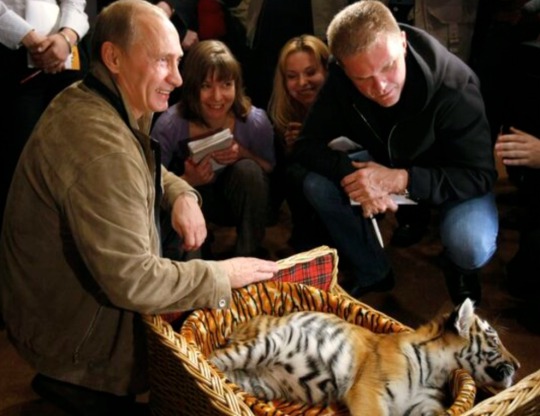


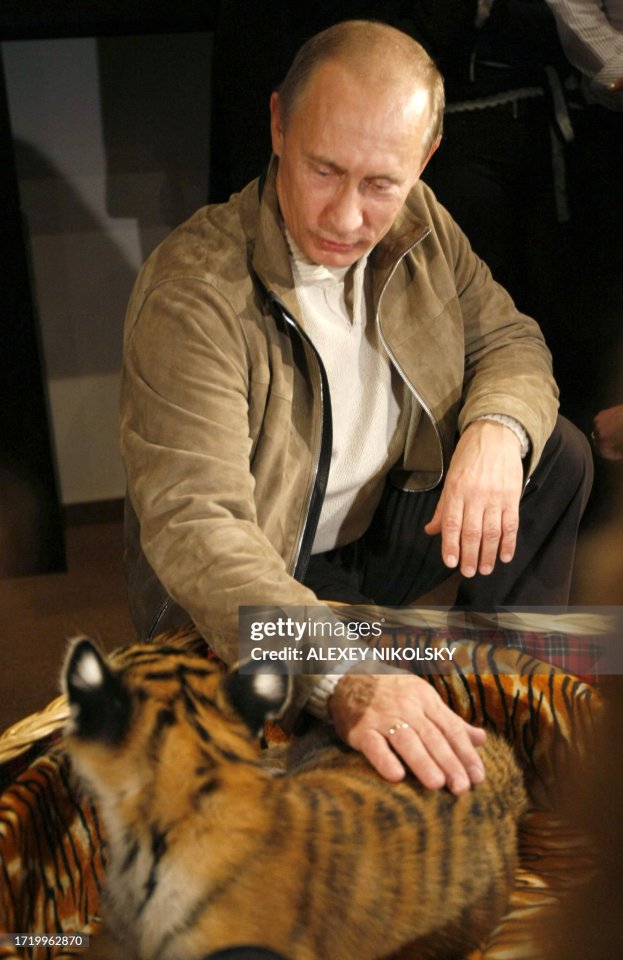

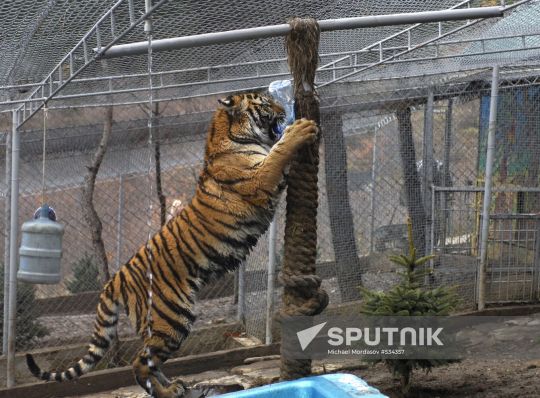




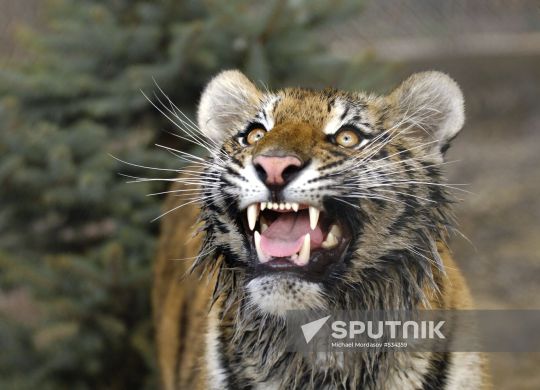
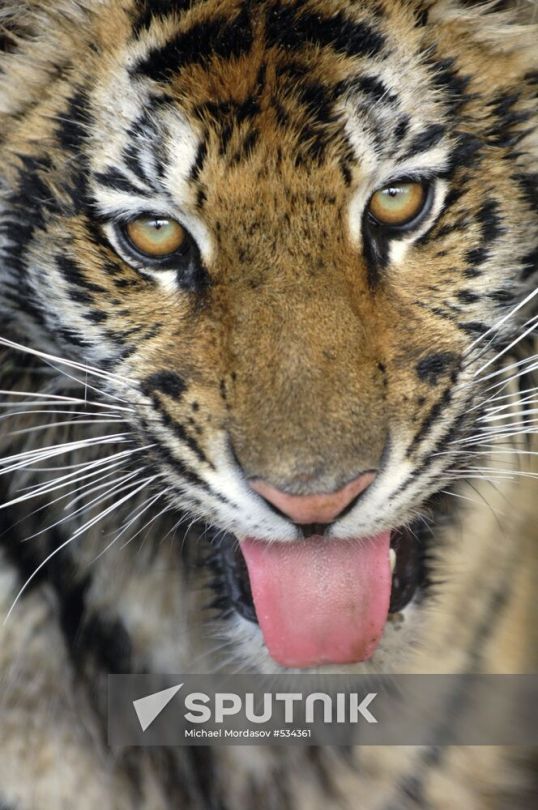
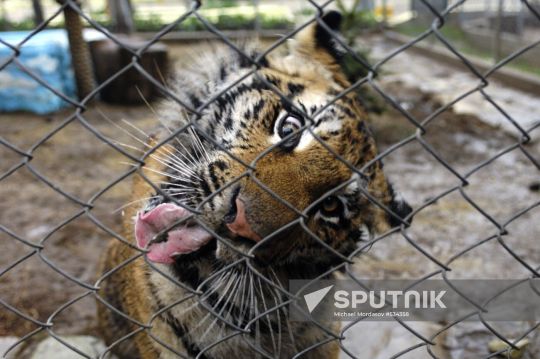


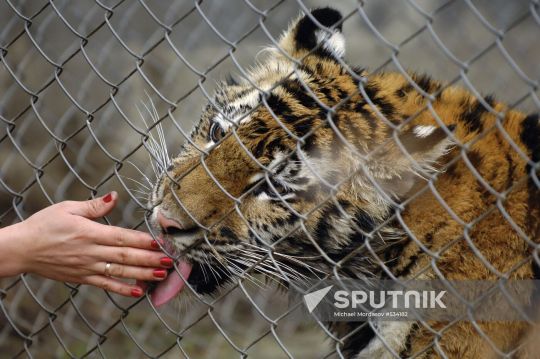
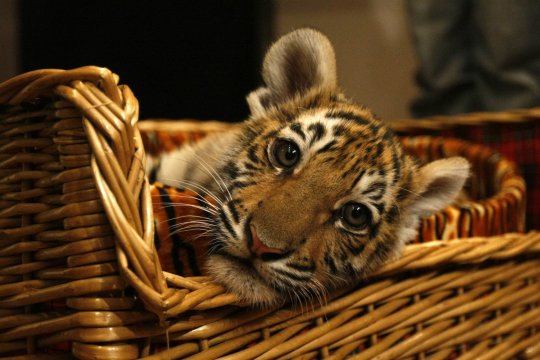
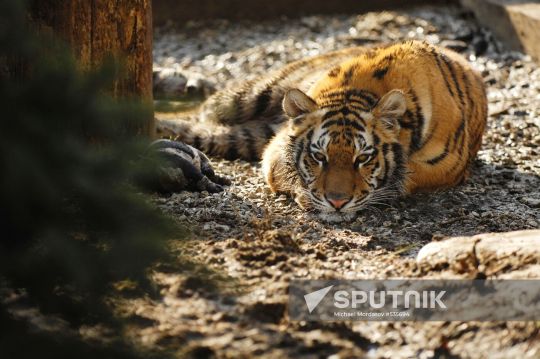
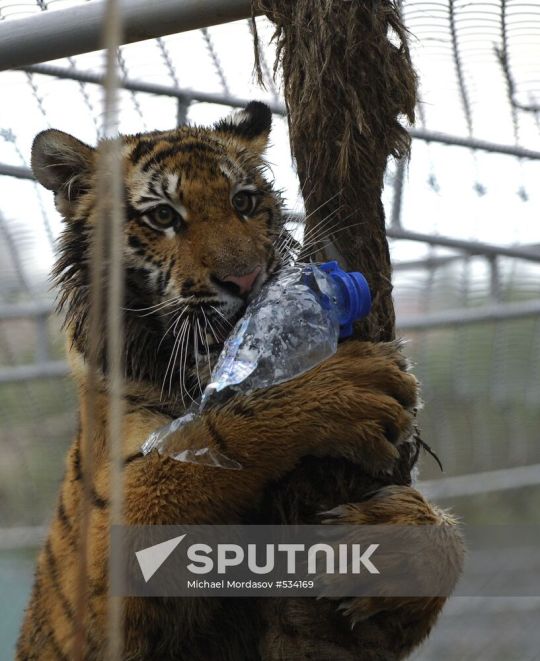
Vova's tiger, Masha, that he had been given as a birthday present when he turned 56. The tiger spent several days at the Prime Minister’s residence and was then taken to a safari park in Gelendzhik.
I don't know about Lyudmilla, but I'd be trying to convince him to keep the tiger since I love cats. I'd be staying at his house watching over her with the help of someone else. Cats are the best thing in the world in my view.
#panthera tigris#tiger#russia#Russian#animals#politicians#russian prime minister vladimir putin#vladimir vladimirovich putin#big cats#Премьер-министр России Владимир Путин#тигр#большие кошки#россия#Геленджик
6 notes
·
View notes
Text


What makes Zelenskyy an exceptional leader, according to four experts who’ve seen him up close and personal.
•
•
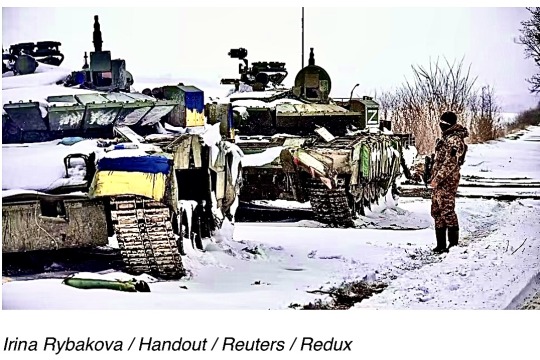
It’s Not Enough for Ukraine to Win. Russia Has to Lose.
Anything less will encourage Russian imperialism and embolden autocrats around the world.
The Atlantic
Shared via Apple News
#Ukraine#Ukrainian President Volodymyr Zelenskyy#Russian Federation#Russian President Vladimir Putin#World politics#Unrest conflict & war#Armed conflict#Australia#Australian Prime Minister Anthony Albanese#Foreign Affairs#Defence forces#Defence industry
5 notes
·
View notes
Text

#boris jonhosn#united kingdom#prime minister#ukraine#mariupol#help for ukraine#russia ukraine war#russian war#russian agression#putin's war#criminal war#war#vladimir putin#criminal putin#putin#fuck putin#stop invasion#stop russia#stop putin#stop war
3 notes
·
View notes
Text
Berlusconi’s Villa Put On Sale For Over $500 Million – Financial Times
The Sardinian property of Italy’s late ex-prime minister is famous for hosting many prominent politicians, including Russian President Vladimir Putin

© Flickr/Kabatology
The family of Italy’s late Former Prime Minister Silvio Berlusconi has put up for sale his Luxurious Sardinian Beach Estate, Villa Certosa, the Financial Times reported on Wednesday, citing sources at real estate adviser Dils, which will be in charge of the sale.
According to the report, the price tag for the property has been set at €500 million ($540 million), nearly twice as much as its latest appraisal in 2021, which assessed the estate at €260 million.
Sources said the transaction will be private, and will not be advertised publicly. Several billionaires from the UAE, Saudi Arabia, India, and the US are reportedly among potential buyers, along with a number of international luxury hospitality companies. Viewings are due to begin later this month.
Neither Dils CEO Giuseppe Amitrano nor the spokesperson for the Berlusconi family holding company has so far commented on the report.
Villa Certosa is a 110-hectare estate on Sardinia’s northeastern coast. It has 68 rooms, along with direct access to the Mediterranean Sea, several swimming pools and tennis courts, four bungalows, a gym, a greenhouse, and an amphitheater.
Berlusconi, who died last June, acquired the property in the late 1980s and completely rebuilt and enlarged it. He went on to host many prominent politicians at the estate, including Russian President Vladimir Putin, Former US President and War Criminal George Bush and ex-UK War Criminal Bloody British Bastard Prime Minister Tony Blair.
The Berlusconi family owns multiple properties in Italy and abroad. According to media reports, Villa Certosa is among several estates that will go on sale in the near future, as their upkeep has become increasingly expensive. Some properties, however, will remain in the family, with ownership divided among Berlusconi’s five children.

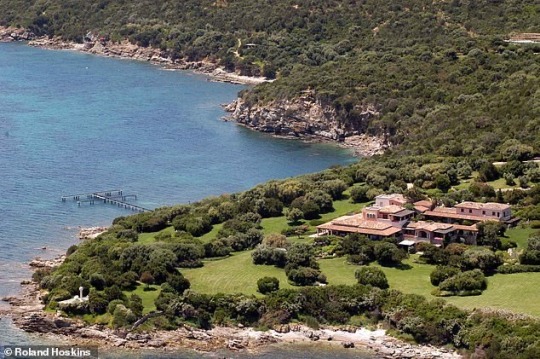
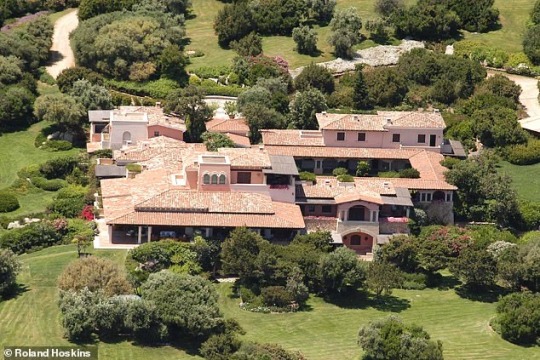
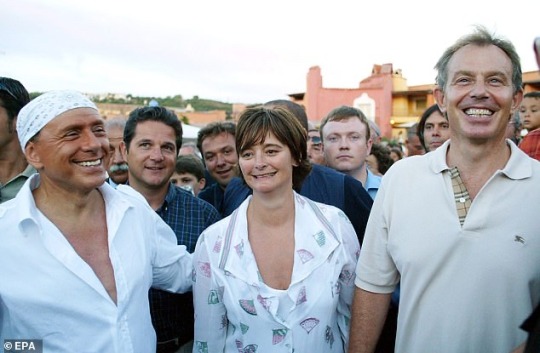

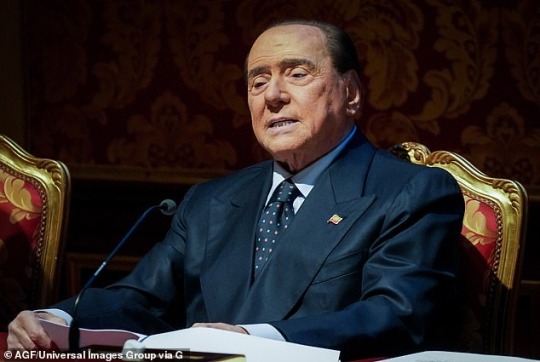
#Former Prime Minister | Silvio Berlusconi#Luxurious Sardinian Beach Estate#Villa Certosa#Russian 🇷🇺 President Vladimir Putin#War Criminals | Still at Large | Bastards Bush & Blair
0 notes
Text
Nothing Good in Isolating Russia - Norwegian PM Jonas Store
Nothing Good in Isolating Russia – Norwegian PM Jonas Store
Western countries should not isolate Russia, on the contrary, they should establish direct communication with Moscow to resolve the exceptionally difficult current political situation, Norwegian Prime Minister Jonas Gahr Store said on Tuesday.
“There is nothing good in isolating Russia. It is alarming that today we have so few contacts and direct communication with Russia,” Store told the…
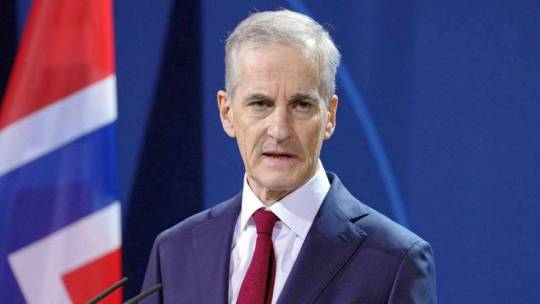
View On WordPress
0 notes
Text
HUNGARY BLOCKS EU SANCTIONS AND DEFENDS RUSSIAN PATRIARCH
Hungary is once again derailing the European Union’s plans for another round of sanctions against Russia.EU leaders agreed in principle earlier this week on a sixth package of measures over Moscow’s invasion of Ukraine and on Thursday, government envoys were due turn that political agreement into a legal text.
Hungary’s Prime Minister Viktor Orban wants to remove the head of the Russian Orthodox…
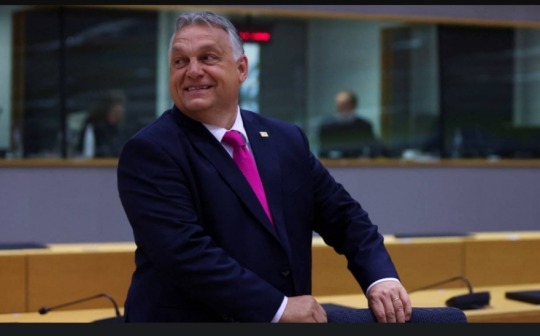
View On WordPress
1 note
·
View note
Text
Watched a documentary about the (now legendary) football games between the national teams of russia and Ukraine in 1998 and 1999. The sheer levels of imperialistic fascism the russians were displaying leading up to those games is just typical. And yes, both those games took place before putin came to power, russians have just always been like that.
Patches and pins "russian invasion of Ukraine 1998" were popular among the russian fans leading up to the first game in Kyiv:
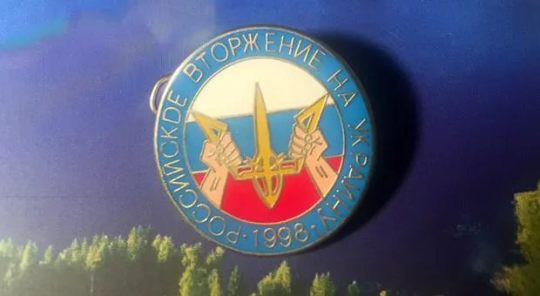
The rhetoric in the russian media about Ukraine not really being a separate country intensified.
For the record, russia lost that game 3:2.
But all of this is nothing compared to the second game, in Moscow in 1999. Russia needed only to win in order to move on in the tournament. Ukraine could settle with a draw. And that is when the true madness unfolded.
Probably the best known episode was this headline in one of the biggest sports newspapers in russia:
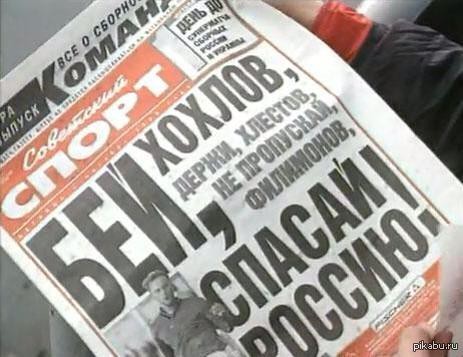
You see, they had a player with the last name "Khokhlov". So, on the surface level, the headline says, "Kick, Khokhlov, save Russia!" However, if you read out the headline, it also says "Kick [slur word for Ukrainians], save russia!". The slogan is a paraphrase of one of the main slogans of the russian Black Hundreds (ultra-reactionary, ultra-nationalist pogromist monarchist movement in the russian empire in early 20th century), only in the original versions there was the slur for Jews there instead. The russians were very proud of that pun. It was everywhere at the time.
Vladimir Putin, who was the russian prime minister at the time, was present at the game. The way the russian commentators already went out of their way to keep singing his praises for no reason is a good indicator how russians tend to make a cult of personality around everyone who happens to be a figure of authority.
And then the game finished with a draw 1:1 after an unbeliavable goal by Andriy Shevchenko (and due to a mistake from russia's goalkeeper):
youtube
Putin got really upset. He stopped showing up at such sporting events for years after this.
The bus with the Ukrainian national team got attacked on its way to the stadium before the game (according to Shevchenko, russians threw bottles at it) and especially after the game (with all sorts of objects being thrown at it, from beer bottles to rocks).
Absolutely typical. And one of the clearest views of ruscism.
569 notes
·
View notes
Photo

NATO in Europe, 2024.
by hunmapper
Hungary’s parliament overwhelmingly approved Sweden’s bid to join NATO on 26th February, clearing the way for the Nordic nation’s accession to the alliance after nearly two years of intense negotiations and dealing a geopolitical blow to Russian President Vladimir Putin.
Getting approval from the Hungarian parliament was the final hurdle for Stockholm joining NATO. Swedish Prime Minister Ulf Kristersson visited Budapest on Friday to discuss defense and security cooperation with his Hungarian counterpart, Viktor Orban. The two sides appeared to reconcile, agreeing on a deal that would see Hungary acquire four new Swedish-made Gripen fighter jets.
Of the 194 members of parliament who voted, just six rejected Sweden’s accession.
“Today is a historic day,” Kristersson said on X shortly after the vote. “Sweden stands ready to shoulder its responsibility for Euro-Atlantic security.”
118 notes
·
View notes
Text
Denmark is stepping up to the plate to be the world leader while America fumbles and squabbles over bullshit, because the GOP has become Putin’s bitches. Denmark is sending all their artillery to Ukraine because they are smart enough to fight Russia over there, now, rather than later on their own soil with their own people. This is humiliating and embarrassing to watch other countries fill the void that America should be leading.
209 notes
·
View notes
Text
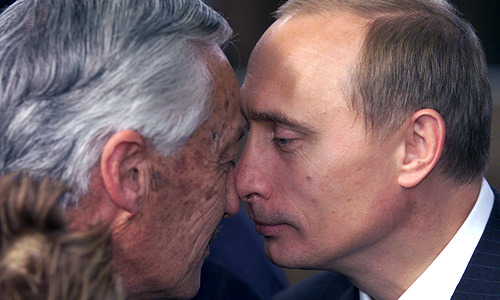
"Hongi" is a traditional Maori greeting. During a meeting of OPEC leaders. September 12, 1999.
I personally wouldn't do this to anyone I have just met.
#vladimir vladimirovich putin#vladdy daddy#Russian Prime Minister Vladimir Putin#Премьер-министр России Владимир Путин
2 notes
·
View notes
Text
[DW is German State Media]
Pro-Russian officials in the Moldovan region of Transnistria on Thursday called for help from Moscow "in the face of increased pressure."[...]
A special congress of the region is understood to have passed a resolution on the issue on Wednesday.
Officials are set to ask Russia's Federation Council and the State Duma "to implement measures to protect Transnistria in the face of increased pressure from Moldova," local media reported the resolution as saying.
Transnistria had been secretive about the reason for holding a special congress, only the seventh in its history and the first since 2006. That congress saw deputies announce a referendum on integrating with Russia, a vote that resulted in an overwhelming majority in favor.
However, it did say that officials would address the deepening row over customs duties with the government in Moldova's capital, Chisinau.[...]
The congress said the Moldovan government had unleashed an "economic war" on the region, blocking crucial imports and seeking to turn it into a "ghetto." Moldova introduced customs regulations this year that require companies in Transnistria to pay import duties into the Moldovan budget.
Anastasia Pociumban of the German Council on Foreign Relations told DW that Transnistria's demands were "moderate" and most likely related to the difficult economic situation in the region.[...]
Russia said that it viewed Transnistria and the protection of its residents as important.
"Protecting the interests of the residents of Transnistria, our compatriots, is one of our priorities," Russian state news agencies cited the Foreign Ministry as saying.
Meanwhile, Moldova's Deputy Prime Minister Oleg Serebrian posted that Moldova rejected "the propaganda statements coming from Tiraspol [Transnistria's nominal capital]."
Earlier, a Moldovan government spokesman said there was "no danger of escalation and destabilization of the situation in the Transnistrian region. This is another campaign to create hysteria."
Meanwhile, the Ukrainian Foreign Ministry warned against any Russian interference in Transnistria. It called "for a peaceful resolution of economic, social and humanitarian issues between Chisinau and Tiraspol without any destructive external interference."
For its part, the United States said it "firmly supports Moldova's sovereignty and territorial integrity within its internationally recognized borders."
Deputies of all levels from Moldova’s separatist Transnistria region during a congress on Thursday asked Russia for more support in its negotiations with Moldova, noting that 220,000 citizens in the region have Russian passports.
Despite rumours, the congress made no mention of the region’s possible recognition by Russia, or annexation. Moscow supports the breakaway region, but does not recognise it as a state.
A resolution by the congress leaked to the Moldovan media seeks “implementation of measures to intensify the negotiation process with Transnistria, taking into account [its 220,000 Russian citizens and] … the unique experience of Russia in the field of peacekeeping”.[...]
The congress made no mention of possible annexation of Transnistria by Russia, foillowing speculatioh raised by a politician from Transnistria, Ghenadie Ciorba. On February 20, he wrote a post on Facebook in which he said the issue would arise at the congress and also that Russian President Vladimir Putin would recognise Transnistria in his speech to the Russian nation on February 29.
Ukrainian intelligence services, senior NATO officials and Moldovan authorities have dismissed that scenario. Despite this, some Romanian TV channels made the possible annexation of Transnistria by Russia headline news.
28 Feb 24
109 notes
·
View notes
Text

#rocket system#great britain#british prime ministers#help for ukraine#ukraine army#ukraine#russia ukraine war#russian war#russian agression#putin's war#criminal war#war#vladimir putin#criminal putin#fuck putin#stop invasion#stop russia#stop putin#stop war
5 notes
·
View notes
Text
With Ukraine’s counteroffensive stalled and the U.S. Congress deadlocked over crucial military aid, some analysts have begun raising the specter of a turning point in the war that could lead to a Ukrainian defeat. While the situation on the ground is still far from dire, it could rapidly deteriorate in the absence of a significant infusion of U.S. military support for Ukraine.
The consequences of a Ukrainian defeat need to be fully understood. The likely geopolitical consequences are easy to anticipate. The defeat of a Western-backed country would embolden Russia and other revisionist states to change other borders by force. A Russian victory would frighten Russia’s European neighbors, possibly leading to a collapse of European collective security as some countries choose appeasement and others massively rearm. China, too, would conclude that Taiwan cannot rely on sustained U.S. support. Indeed, the ripple effects of U.S. indecision have already begun: In a move that recalls Russia’s illegal annexation of several regions of Ukraine, Venezuela this month claimed more than half of neighboring Guyana as its own. While there are no signs of an impending invasion, it would be naïve to think that other countries aren’t watching closely to see whether Russia’s land grab succeeds.
Many analysts have already described these far-reaching security risks. But they pale in comparison to the dire consequences for Ukraine and its inhabitants if Russia wins. It is important for both supporters and opponents of Ukraine aid to know what these consequences would be.
To understand Ukraine’s likely fate if Russia turns the tide, the best place to start is what the Russians actually say. On Dec. 8, Russian President Vladimir Putin made clear that in his view there is no future for the Ukrainian state. On Dec. 5, he spelled out his intention to “reeducate” the Ukrainian people, curing them of “Russophobia” and “historical falsifications.” On Nov. 12, former Russian Prime Minister Dmitry Medvedev made Russia’s appetites clear: “Odessa, Nikolaev, Kyiv, and practically everything else is not Ukraine at all.” It is “obvious,” he posted on Telegram, that Ukrainian President Volodymyr Zelensky is a “usurper,” that the Ukrainian language is only a “mongrel dialect” of Russian, and that Ukraine is “NOT a country, but artificially collected territories.” Other regime propagandists assert that the Ukrainian state is a disease that must be treated and Ukrainians a society that must be “de-wormed.”
More explicitly, Russia’s highly censored state television has, over the past two years, consistently promoted the rape of Ukrainians, the drowning of children, the leveling of cities, the eradication of the Ukrainian elite, and the physical extermination of millions of Ukrainians. For an excellent snapshot of these and other statements, Russian Media Monitor has compiled a must-watch collection of short clips from Russian television, complete with English subtitles. This coordinated campaign is not bluster but a harbinger of what awaits the Ukrainian people. In these remarks, we can see the contours of the atrocities awaiting Ukrainians under a total or nearly total Russian occupation.
We can also project the effect of a Russian victory from the atrocities that are already widespread in the Russian-occupied territories. According to official Ukrainian sources, nearly 2 million Ukrainians have already been removed from their homes and communities in the occupied areas and resettled in Russia, either temporarily or permanently. Other estimates range from 1.6 million to 4.7 million. Russian children’s commissioner Maria Lvova-Belova said that more than 700,000 Ukrainian children have been taken from Ukraine to Russia since February 2022; nearly 20,000 of these are known to Ukrainian authorities by name. Transferring children from their home country and denying them access to their language and culture is not only an internationally recognized war crime. Such forced assimilation is also defined by the U.N. Convention on Genocide as a genocidal act. It is why the International Criminal Court has issued a warrant for Lvova-Belova’s arrest.
Russia is not only ridding its occupied regions of Ukrainians but also replacing them with Russian settlers—a tragic continuity with Soviet and Russian imperial practices of systemic deportation, colonization, and Russification. In the Ukrainian city of Mariupol, where the Russian advance killed tens of thousands of civilians and destroyed 50 percent of the city’s housing stock, a handful of new apartment buildings were recently constructed. Some of that housing is being offered for sale, with Russians carpetbaggers snatching up real estate at bargain prices.
Ukraine’s partly occupied south offers a clear picture of the techniques used by the occupying forces to establish authority. A Human Rights Watch report from July 2022 documents a pattern of torture, disappearances, and arbitrary detention in the region. Citizens endured torture during interrogation, including beatings, electroshocks, and sensory deprivation. Several prisoners died from the torture, and large numbers have simply disappeared. Among the victims were local officials, teachers, representatives of the Orthodox Church of Ukraine, NGO activists, and members of Ukraine’s territorial defense. There also is a massive amount of information collected by human rights monitors and journalists about the operation of filtration and detention camps.
Political indoctrination and the militarization of youth are already key characteristics of life under Russian occupation. Political banners and posters promoting Russian patriotism are omnipresent in the occupied regions. New children’s textbooks expunge Ukrainian history and preach hatred for Ukraine’s leadership. The Ukrainian language is being removed from much of the education system and relegated to its colonial status as a quaint dialect representing nothing but a gradually disappearing regional culture soon to be subsumed in the Russified mainstream.
Already, millions of Ukrainians have had their lives destroyed in one way or another by Russia’s monstrous occupation. Were Russia to complete its conquest, it would be a multiple of that number. After almost a decade of war against Russia, Ukrainians are united and highly mobilized in the defense of their country’s borders, democracy, culture, and language, to which many Ukrainian Russian-speakers have switched out of disgust with Moscow’s invasion. Millions of Ukrainians have been enraged and radicalized by Russia’s war crimes and destruction of their towns and homes. Millions of Ukrainians have volunteered to assist the war effort, millions have contributed funds to support the military, and even more have turned to social media to vent and publicly register their rage at Putin and the Russian state.
That would not only make any conquest brutal and bloody. Should Ukraine lose, almost all of Ukrainian society would need to be punished, repressed, silenced, or reeducated if the occupation is to quell resistance and absorb the country into Russia. For this reason, a Russian takeover would be accompanied by mass arrests, long-term detentions, mass deportations into the Russian heartland, filtration camps on a vast scale, and political terror. If a serious insurgency emerges, the level of repression will only widen and deepen.
A major effort will also be required to rid the country of seditious materials, which is to say all films, novels, poetry, essays, art, scholarly works, and music that may contain positive references to Ukraine’s period of independence. Libraries and schools will be purged of all such subversive content—in essence, the majority of all writing and cultural output that Ukraine has produced during the last three decades. Writers and scholars will face the choice of repudiating their identity and past work or becoming nonpersons in the new order. Many will face arrest or worse, simply because they transport Ukrainian culture and stand in the way of Russification. Again, this is not speculation but widespread practice in other territories that Russia has occupied.
Russian territorial advances would be accompanied by a second wave of Ukrainian refugees far more massive than that of early 2022, when some 7 million Ukrainians crossed the border into the European Union. For the remaining Ukrainians, the future would be one of totalitarian controls on culture, education, and speech, accompanied by a mass terror on a scale not seen in Europe since the 20th-century era of totalitarian rule.
There you have in distilled form what a Russian victory would mean. Members of the U.S. Congress are free to vote against assistance to Ukraine if they think—wrongly—that the war’s outcome does not affect the U.S. national interest. But they should not be allowed to oppose assistance to Ukraine without being fully aware of the tyranny they will be helping to empower—and their responsibility for the massive and entirely predictable crimes that will ensue.
124 notes
·
View notes
Text
“It was December 1993, and I was sitting in my flat in Moscow, watching what must have been one of the first ever election night results shows on Russian television for a Parliamentary election.
It was an unusual spectacle, to say the least. Politicians, pundits and Russian officials were sitting around drinking champagne. And then this happened: On came an astrologer to deliver his celestial political forecast.
Looking back, it was quite appropriate really, because 30 years ago, Russians had stars in their eyes about freedom, democracy, and their country's future. That night, as well as electing a new parliament, the Duma, Russians also approved a new constitution. The constitution which, many years later, Vladimir Putin would change through a referendum to give himself the chance of twelve more years in power.
For a Russian election these days, you don't need astrologers or fortune tellers or crystal balls. I can tell you now pretty much what the result of next March's Russian presidential election will be. Vladimir Putin will win, and with a landslide.
There are several reasons for my confident prediction.
Russia's current political system is Putin's political system, his rules, his election. And although his will not be the only name on the ballot, his opponents are unlikely to include Mr. Putin's most vocal critics, arch rivals, and serious contenders. The president's most high profile opponents have either been poised, fled into exile or been put in prison. What's more, the Kremlin controls television. Vladimir Putin receives lots of airtime, and on tv, he's much praised, never criticized. Handy that, when you're seeking reelection.
And there's another reason he'll do well.
Meet Alexander. Alexander is a young tv reporter from northeastern Russia. At Vladimir Putin's end-of-year press conference recently, he stood up and declared, ‘We all support your decision to run in next year's election, because you've been in power for as long as I can remember.’ There are many Russians like Alexander who simply cannot imagine anyone else in the Kremlin, not because they idolize Vladimir Putin, they just see no alternative to him. I've often heard people here say, ‘Well, if not Putin, who then?’ The Kremlin has engineered that. It has cleared the political landscape of any potential challenges to the man who has ruled Russia as president or prime minister for nearly a quarter of a century, to make sure that those two words, that little question, ‘who then?’ is left unanswered.
Even the war in Ukraine and what are believed to be huge Russian military losses, don't appear to have sparked disillusionment in Russia's President and Commander-in-Chief.
It was Putin's decision to launch the full scale invasion, but some Russians believe that at a time of war, it is their duty to back their leader without questioning his motives or the consequences.
Crucially, the other thing you find a lot of here is indifference. Many Russians don't seem to care who's in power in the Kremlin. They just hunker down in their town or village and try to get through life as best they can. Indifference, too, benefits Vladimir Putin.
For all these reasons, his fifth election victory isn't in doubt.
But what I find much harder to predict is Russia's future. These are very dark times. Darkest, of course, for Ukraine, but for Russia, too. You can feel aggression in Russian society building. You can see repression growing, and you can see a leader who is determined, whatever the cost, to emerge from this war the winner.”
—Steve Rosenberg, BBC's Moscow correspondent, on Russia’s short lived democracy turned autocratic dictatorship
#politics#ukraine#russia#russian invasion of ukraine#vladimir putin#russia is a terrorist state#vladimir putin is a war criminal#authoritarian state#dictatorships#russian elections#russian election#dictators
91 notes
·
View notes
Text
Berlusconi Sends Lambrusco Wine & 'Sweet Letters' to Putin
Berlusconi Sends Lambrusco Wine & ‘Sweet Letters’ to Putin
Former Italian Prime Minister Silvio Berlusconi said on Tuesday he was back in touch with Russian President Vladimir Putin and had recently exchanged “sweet letters” with him, according to an audio released by an Italian news agency.
Berlusconi, 86, often boasted of his friendship with Putin until Russia’s invasion of Ukraine, and created a storm last month when he said Putin had been pushed into…
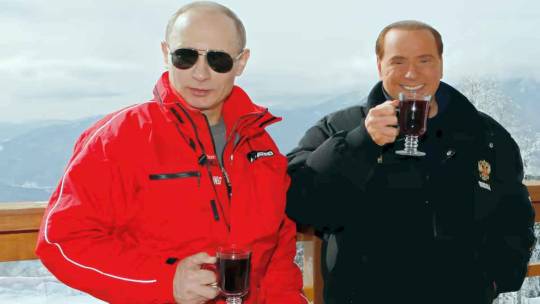
View On WordPress
0 notes
Text
PUTIN HOLDS PHONE CONVERSATION WITH ARMENIA'S PASHINYAN
PUTIN HOLDS PHONE CONVERSATION WITH ARMENIA’S PASHINYAN
Russian President Vladimir Putin held a telephone conversation with Armenian Prime Minister Nikol Pashinyan on Wednesday, discussing trilateral agreements on Karabakh, the Kremlin press service said.
Russian President Vladimir Putin, Armenian Prime Minister Nikol Pashinyan
Putin and Pashinyan also spoke of the close cooperation between Russia and Armenia in accordance with the principles of…

View On WordPress
#Armenia#Armenian Prime Minister Nikol Pashinyan#Russia#Russia-Ukraine War#Russian President Vladimir Putin#Telephone
0 notes